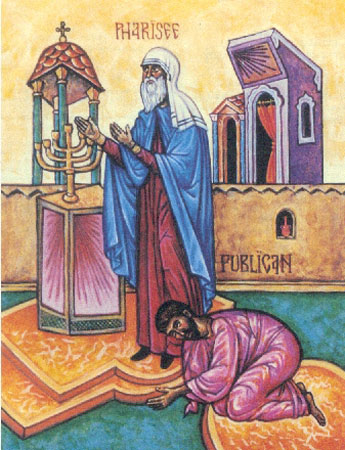On this Sunday, we
commemorate the Parable of the Publican and the Pharisee,
from the Holy Gospel According to Saint Luke (18:10-14).
The present three Feasts,
of the Publican and the Pharisee, the Prodigal Son, and the
Second Coming, were devised by the Holy Fathers as a
preliminary exercise and an incentive to prepare us and make
us ready for the spiritual arena of the Fast, by leaving
behind our customary and loathsome habits. First of all they
set forth for us the Parable of the Publican and the
Pharisee, and they call this week the Proclamation. For,
just as those who are about to depart for physical combats
learn in advance from their generals the time of battle, in
order that they may clean and polish their swords, and make
all the other due preparations, and, removing all
impediments, may eagerly strip down for the contests and
procure what is necessary.
Since the first weapon that
we need in order to acquire virtue is repentance and
humility, and since the greatest obstacle to its acquisition
is boasting and pride, the Fathers set forth the present
trustworthy parable from the Holy Gospel first of all. By
means of the Pharisee, they urge us to lay aside the passion
of boasting and self-conceit, and by means of the Publican,
on the other hand, to seek after humility and repentance,
the opposite of this passion. For, since boasting and
self-conceit are the first and worst of the passions,
because thereby the Devil fell from Heaven—he who was
formerly called the Morning Star and who, through his pride,
became darkness and was called by that name— and since Adam,
the father of our race, was driven from the Paradise of
delight on account of pride, the Holy Fathers exhort us,
through these examples, in no way to boast of our own
accomplishments or set ourselves up against our neighbor,
but always to be humble; for “God resisteth the proud, but
giveth grace unto the humble.”
|
